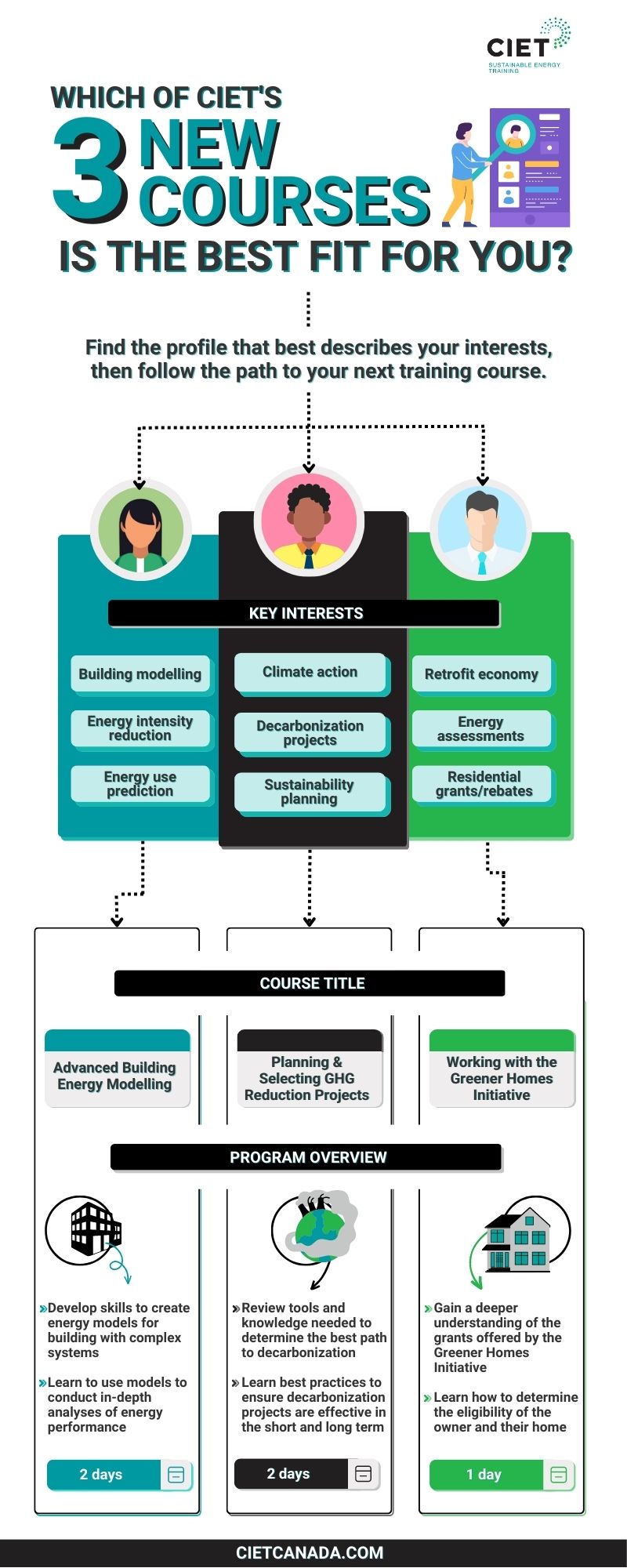
The field of energy efficiency and decarbonization is an ever-evolving industry. Seasoned professionals know the importance of staying up-to-date with the latest best practices and technology. CIET always aims to stay on top of the current needs of professionals to ensure the most in-demand training, skills and knowledge are available (for existing professionals and newcomers to the energy efficiency field).
To help you become more familiar with three of our new training courses, we've created a path you can follow based on your interests.

Learn more about your results. Which course did your interests lead you to?
(Click a course title to get more information)
The advanced building energy modelling course is focused on developing skills that energy modellers utilize in creating energy models for buildings with complex systems and using those models to conduct in-depth analyses of energy performance. This approach is now more frequently implemented for new construction projects that need to meet the increasingly more stringent energy efficiency requirements of building codes as well as deep energy retrofits in existing buildings.
This course is designed for participants that completed the Building Energy Modelling Professional course or have similar knowledge. It is assumed that participants understand how building systems operate and have developed energy models for buildings with conventional systems that resulted in working energy model files.
→Learn more about this course & find an upcoming session.
This course provides participants with the tools and expertise needed to determine the best path to decarbonization aligned multiple organizational objectives including emission reduction targets, capital planning cycles, operator capacity and expertise, and climate adaptation. Participants learn best practices as developed through real world expertise to ensure their decarbonization projects are effective in both the short and long term.
Day 1 is focused on decarbonization planning and portfolio level prioritization. We review triggers for decarbonization upgrades, benchmarking tools, and energy studies. Participants create a plan for decarbonizing an example portfolio.
Day 2 is focused on prioritizing individual projects within buildings, interactive building effects, and the implementation and M&V considerations as well as how to develop a low carbon roadmap for an individual facility. The course content is presented using a number of case studies across the commercial, institutional, multi-unit residential, and light industrial sectors.
→Learn more about this course & find an upcoming session.
This one-day training will provide a deeper understanding of the grants offered by the GHI. It will clarify how to determine the eligibility of the owner and his home. Also, the participants will learn how to navigate and find the tiny little details important to make the GHI work. Finally, a synthesis activity with varying scenarios will help the participants encapsulate their new knowledge.
This course is right for you if you are or will be a Natural Resources Canada Registered Energy Advisor interested in delivering the GHI. This knowledge is valuable to every future EA’s and actual EA’s wanting to have a smooth experience dealing with homeowners and Greener homes personnel.
→Learn more about this course & find an upcoming session.

|
Training calendar |

Would you like to be trained on a specific topic? Just let us know!
Express my interestSend us an email and we will respond as soon as possible.

This is to inform you that the course date is too close to be able to ship hard copies of the material to you on time. If you are willing to use the material in secured PDF, receive the material later (likely after the course) and pay upon registration, please click OK to continue the registration process. Please note that the shipping process will start only when the course fees are paid in full and delays are to be expected. Many thanks!